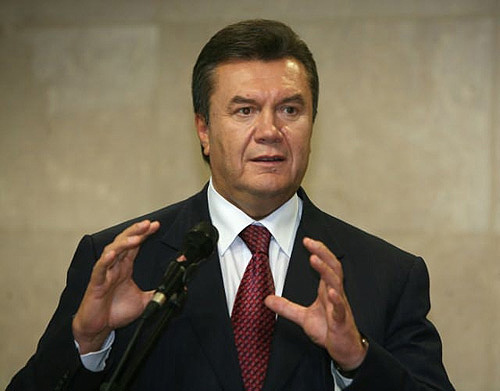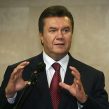
Ukrainian Presidential Candidate Viktor Yanukovych: Foreign Policy Priorities
Publication: Eurasia Daily Monitor Volume: 6 Issue: 202
By:

Viktor Yanukovych was put forward as a presidential candidate at the congress of the Party of Regions on October 23 (www.partyofregions.org.ua, October 23). Yanukovych’s foreign policy can be gauged from several policies that he and his party have previously supported and the content of his January 17, 2010 election program “Ukraine For the People!” (www.yanukovych.com.ua, October 28).
During the October 23 congress, Yanukovych promised to provide Ukraine with a “new foreign policy” as a non-bloc state pursuing its “national interests” (Ukrayinska Pravda, October 23). Yanukovych’s foreign policy would be more pro-Russian than the pro-Western multi-vector pursued by President Leonid Kuchma in 1994 to 2004. In Kuchma’s first term, Ukraine actively sought cooperation with the U.S. and NATO and he announced in 2002 Ukraine’s intention to seek NATO membership, while one year later he sent Ukrainian troops to Iraq. Moreover, Yanukovych is more anti-NATO than Kuchma who was more cognizant of the Russian threat, whether in the 1990’s when Moscow refused to recognize Ukraine’s borders until 1997-1999, or when it made territorial claims on the island of Tuzla in 2003. Kuchma cut short a visit to Brazil to visit Tuzla as commander-in-chief ready to rebuff a potential Russian invasion.
In a visit to Brussels on September 14, 2006, Prime Minister Yanukovych told NATO that Ukraine was not interested in receiving a Membership Action Plan. Kuchma made Ukraine into one of the most active members of NATO’s Partnership for Peace program and no protests ever took place that halted annual joint military exercises in Ukraine. Since 2005, the Party of Regions and its Crimean Russian nationalist-separatist allies have held protests that have on occasion halted joint exercises with NATO (EDM, September 18, 2006).
In fact, formally the Party of Regions has never opposed Ukraine’s membership in the E.U., unlike NATO; but, equally they have not taken any steps to move Ukraine towards E.U. membership. Yanukovych repeatedly attacks the “Euro-romanticism” of his Orange Revolution opponents, whether Viktor Yushchenko or Yulia Tymoshenko, believing that Ukraine’s relations with the E.U. should be “pragmatic.” Yanukovych told the October 23 congress that he would support a “new common market” with the E.U. and the CIS. Ukraine and the E.U. are likely to sign a Free Trade Zone (FTZ) next year, a step that became possible only after Ukraine joined the WTO in 2008 (www.partyofregions.org.ua, October 23). One reason as to why the process of joining the WTO took three years after Ukraine was recognized by the U.S. and E.U. as a market economy was that the Party of Regions did not vote in 2005-2006 for the legislation that was required to join the WTO.
The Party of Regions has avoided joining any political group in the European parliament, unlike Tymoshenko’s Fatherland and Yushchenko’s Our Ukraine (members of the center-right European People’s Party) or the Socialist Party (members of the Socialist International). All three members supported the Orange Revolution and Yushchenko’s election. The Party of Regions leaders, such as Mykola Azarov, are strong supporters of Ukraine fully joining the CIS single economic space. Kuchma only supported joining the first stage: a free trade zone.
Yanukovych has also adopted Moscow’s position on the Georgian leadership. The Party of Regions initiated a parliamentary commission into the supply of arms to Georgia that backed Russian claims concerning Viktor Yushchenko militarily supporting the Georgian President Mikheil Saakashvili. It was Kuchma who had started a military relationship with the former Georgian President Eduard Shevardnadze –not Yushchenko. Kuchma initiated the GUAM (Georgia, Ukraine, Azerbaijan, and Moldova) regional group on the basis of common threats from Russian-backed separatism and energy dependency on Russia. Three of the GUAM members had frozen conflicts and a fourth, Ukraine, had a potential separatist conflict in the Crimea. During the 2006-2007 Yanukovych government it showed little interest in GUAM.
Yanukovych is unlikely to pursue alternative sources of energy in order to reduce Ukraine’s dependency on Russia, a major factor behind GUAM’s creation, and would not support supplying the Odessa-Brody pipeline with Azeri oil (using it in a south-north direction, rather than north-south with Russian oil). Yanukovych would invite Russia to join the pipeline modernization agreement signed by Tymoshenko and the E.U. in March. Yanukovych might also revive use of the corrupt RosUkrEnergo gas intermediary that Prime Minister Tymoshenko successfully fought against in 2006-2008 and finally removed in 2009 from Ukraine’s gas relationship with Russia. An influential gas lobby took control of the Party of Regions in 2007-2008 and corrupted party politics, parliament and the presidential secretariat. Energy corruption has proven a major factor in undermining Yushchenko’s presidency (Ukrayinska Pravda, February 12).
Crucially, Yanukovych is leader of a party whose main bases of support are in Ukraine’s two most pro-Russian regions: Donbas and the Crimea. Yanukovych has faithfully followed the Russian position of blaming Ukraine’s leaders for the deterioration of bilateral relations with Russia; for example, backing complaints in President Dmitry Medvedev’s August letter to Yushchenko. Yanukovych has supported Russia’s lobbying effort to extend the Black Sea Fleet’s lease of Sevastopol indefinitely beyond 2017 (Kyiv Post, October 24).
Kuchma was a strong opponent of separatism in Ukraine and abroad. For example, he would never permit pro-regime centrist parties to support separatism. Belarusian President Alyaksandr Lukashenka and other CIS leaders have not recognized the independence of Abkhazia and South Ossetia. Party of Regions and the Communist Party supported their independence in votes in the Ukrainian and Crimean parliaments. Indeed, 140 out of 172 Party of Regions deputies supported the Ukrainian parliamentary vote, but it failed to be adopted, unlike in the Crimean parliament, where the For Yanukovych bloc has a majority. In the Crimean parliament the Party of Regions is aligned with Russian nationalist-separatists in the For Yanukovych bloc. In the Kuchma era, the ruling centrist party in the Crimea (Kuchma’s party), the People’s Democratic Party (NDP), would not have developed such close links with Russian nationalist-separatists.
Yanukovych’s and Kuchma’s multi-vector foreign policies are fundamentally different, pro-Russian rather than pro-Western and would take Ukraine back even in relation to the Kuchma era. Yanukovych’s foreign policy is also different from Tymoshenko’s pro-Europeanism and Arseniy Yatseniuk’s isolationist nationalism. Ukrainian voters, therefore, have a clear-cut choice between three distinct courses in foreign policy.




